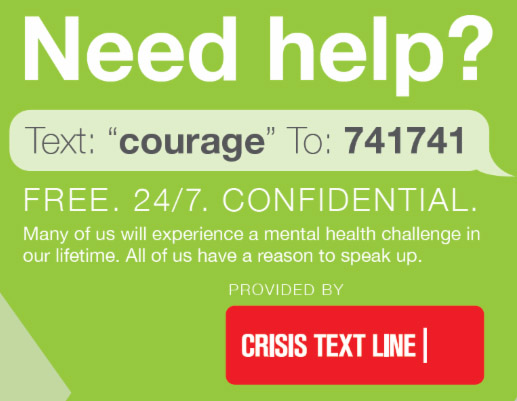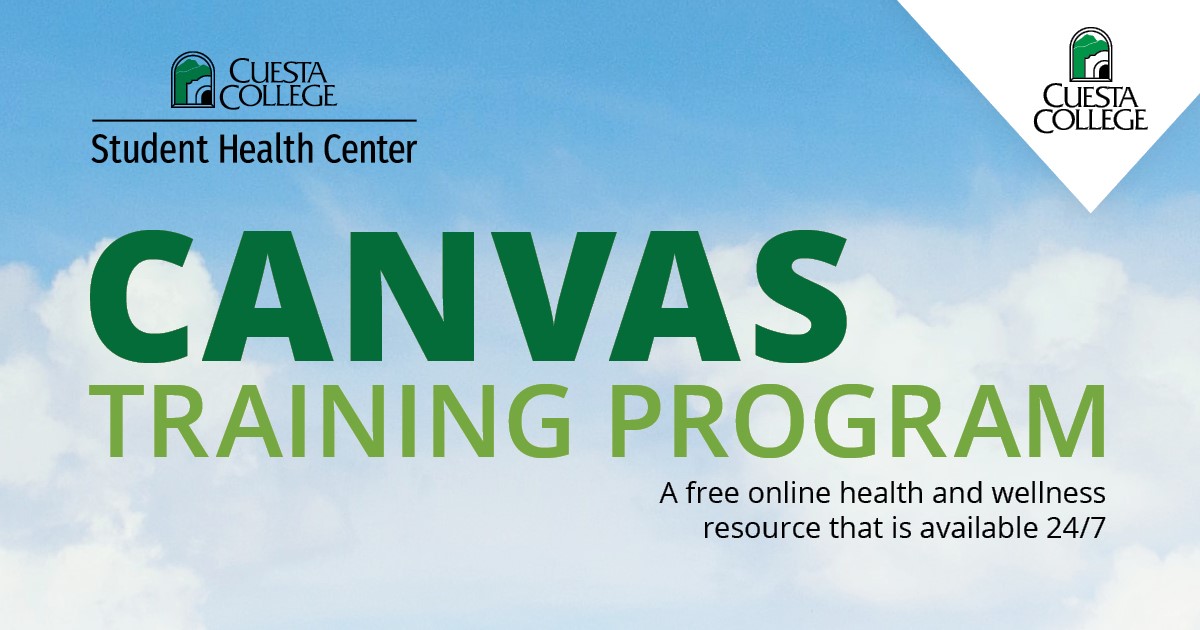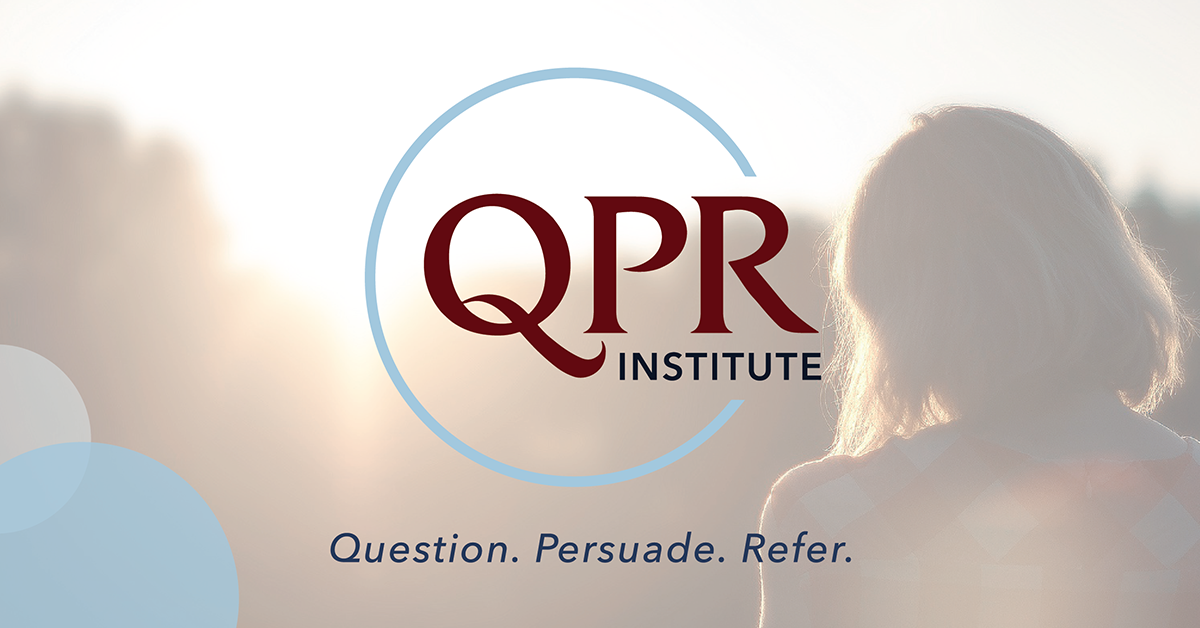Digital, educational, communicative tools to promote health and well-being among the Cuesta College Community.
Digital Repositories offer a convenient infrastructure through which to store, manage, re-use and curate digital materials.
At the Student Health Center, we believe in the importance of designing educational & communicative strategies to promote health and well-being as part of our students’ lifestyle. We support students and help them learn valuable skills they need to make healthy and informed choices throughout their lifetime.
Health Center Resources and Trainings
Are you interested in a presentation (10-15 minutes), workshop (30-45 minutes), or training? We offer in-person and online support, and we can adapt our presentation to your availability and class-time needs. Learn more about these opportunities and request a classroom experience by completing this online.
Request a Training/Workshop
Think Hopeful, Inc. provides one-of-a-kind wellness support. This is an anonymous peer community with
1:1 health coaching for students. Using science based mental wellness strategies,
students connect with college students and have access to 1:1 dedicated coaching and
wellness groups. Services are available during after-hours and weekends too! You can
bring a 10-minute presentation about the Think Hopeful program into your classroom!
Topics include: stress, anxiety, relationships, nutrition, finances, general wellness. There are
no deadlines for registration since this will be an ongoing service. Students can
register any time by emailing: Admin@ThinkHopeful.com.
Think Hopeful’s Wellness Program FAQs
For more information email:
studenthealthcenter@cuesta.edu
or Admin@ThinkHopeful.com
Concerned about a student?
We have faculty & staff support lines through Think Hopeful.
WHAT IS IT? Are you concerned about a student? Notice behavioral or mood changes and unsure how
you can support? You can have a direct consultation with a licensed mental health
professional to support the student in a non-crisis situation
WHEN? Any day – you can expect a response within the same business day
HOW? Email Admin@ThinkHopeful.Com
WHAT’S THE PROCESS? No forms and no wait times. An email will allow you to confidentially consult with
a licensed mental health professional (in a non-crisis situation).
***For crisis, please follow directions or contact the Student Health Center at studenthealthcenter@cuesta.edu or (805) 546-3171
Other Helpful Tools and Resources
- *Please note, the new phone number for campus police on NCC is the same for SLO - 3911 from any campus phone. **NCC Health Center is now located at N1013.
- Responding to Mental Health Emergencies & Well-being Concern reports
- Know how to refer a student: Basic Needs and Well-Being Concern
- Link to the Student Health Services Webpage for your syllabus: Telehealth and In-Person Appointments; free mental health therapy
from licensed professionals; medical appointments with a Physician Assistant and nurses;
over the counter and prescription medications; digital resources and events; stay updated by following us: Facebook/ Instagram @cuestahealthcenter
“Success in this course depends heavily on your personal health and wellbeing. Recognize
that stress is an expected part of the college experience, and it often can be compounded
by unexpected setbacks or life changes outside the classroom. I strongly encourage
you to reframe challenges as an unavoidable pathway to success. Reflect on your role
in taking care of yourself throughout the term, before the demands of exams and projects
reach their peak. Please feel free to reach out to me about any difficulty you may
be having that may impact your performance in this course as soon as it occurs and
before it becomes unmanageable. In addition to your academic advisor, I strongly encourage
you to contact the Student Health Center for the many support services on campus that
stand ready to assist you"
Webpage: Student Health Services
Phone Number: (805) 546-3171
Location: SLO: Building 3100, Room 3150; NCC: N1013 (North County Campus Center)
24/7 Hotlines


Videos
There are many ways to relieve the effects of stress on our mind, body, and life. Students are welcome to join us to improve their mental health and success during finals.
VIDEO: Mindfulness, Meditation and Anxiety Management Techniques Worksh
This workshop intends to shine light on our modern day experiences of loneliness. Recent research about loneliness and its consequences will be considered while a multi-dimensional approach to understanding loneliness will broaden our perspective on this contemporary topic. We discussed social media and how its use contributes to such problems in our lives.
Over the last ten years, there has been an increase in the number and severity of behavioral incidents in the classrooms and on campuses. More and more, it is incumbent upon instructors to intervene in the classroom to address behaviors that can interfere with teaching and learning. Using a combination of lecture and case studies taken from actual incidents, this workshop will provide instructors with tools to appropriately address these behaviors. Participants will be provided with skills to prevent disruptive behaviors, to react to them, and tips on how to enhance their own campus procedures to address abhorrent behaviors.
VIDEO: Behavioral Interventions and support Workshop 1 by Brian Van Brunt, Ed.D
More and more, front line office staff, residence life staff, and office managers find themselves having to manage unruly students, parents, and visitors in their office environment. Preventing the disruption before it begins is key, but managing difficult people is a learned – not innate – skill. Using proven techniques, the presenter will draw on actual cases from experience managing office environments and training in diffusing difficult situations to teach participants how to prevent and handle these delicate situations by “staying centered.” Our presenter has presented these techniques to over 1,000 managers and supervisors in the corporate and higher education environments, as well as to front line student staff and law enforcement.
VIDEO: Behavioral Interventions and support Workshop P2 by Brian Van Brunt, Ed.D
- Case management video series (Andy): resource/video from Behavioral Interventions Workshop.
- Case management video series (Nick): resource/video from Behavioral Interventions Workshop.
Wellness During a Prolonged Pandemic: The reality is, our sense of “normal” has changed
completely — classes have moved online, internships have been postponed, and social
activities look much different than they did a year ago. Every one of us is dealing
with a serious strain on our mental health.
Connecting our students with wellness, health resources and healthy tips has been
one of our main strategies to support and guide them in challenging times.
Presented by, Ashley Hart, Psy.D. – Psychologist at Student Health Services.
Nicole Johnson, R.N., M.S.N. - Director of Student Health Services.
VIDEO: Behavioral Interventions and support Workshop P2 by Brian Van Brunt, Ed.D
This workshop will shine light on our human experiences of loneliness as part of an effort to alleviate the stigma around it. We will explore the following questions: 1)What is the difference between being lonely, alone and in solitude? 2) How are technology use and the pandemic influencing our experiences of community? 3) How does our relationship with nature relate to our experiences of loneliness? By. Dara Sheik, LCSW.
Digital Tools
This guide is a reference from Behavioral Interventions Workshop.

Is one of the ways that we are working to enhance Cuesta College’s culture of wellness. Campus Well is a FREE, online magazine covering a variety of college health issues including stress, sleep, nutrition, alcohol, safe sex, colds, flu, and more. we believe that the health and wellness of our students is the foundation for academic and life-long success. Our features provide students evidence-based approaches to positively influencing health, wellness, productivity, motivation, and more. Learn more about our services

Your health and wellness are important and connected to your ability to succeed as a student. Wellness Central is a free online health and wellness resource that is available 24/7 in your space at your pace. Learn more in the Wellness Canvas Training Program.

QPR stands for Question, Persuade, Refer,
3 simple steps anyone can learn to help save a life from suicide.
QPR teaches participants how to recognize the warning signs of a suicide crisis and
how to question, persuade, and refer someone to appropriate help. Join the hundreds
of SLO County community members who have already been trained to help our friends,
colleagues, family members, and neighbors through
a suicide crisis.
For more information is available on QPR.
To Schedule a training , please contact studenthealthcenter@cuesta.edu or Presentation Request Form

Adult Mental Health First Aid teaches you how to identify, understand, and respond to signs of mental illnesses and substance use disorders in other adults.
This training gives you the skills you need to reach out and provide initial support to individuals who may be developing a mental health or substance use problem and help connect them to the appropriate care.
More information on Mental Health First Aid
To Schedule a training for 5 folks or more, please contact: studenthealthcenter@cuesta.edu or Presentation Request Form
